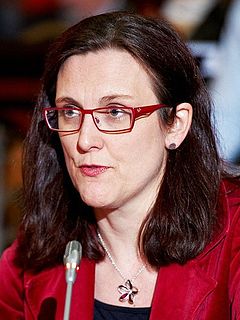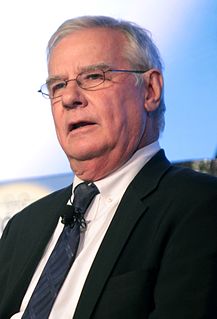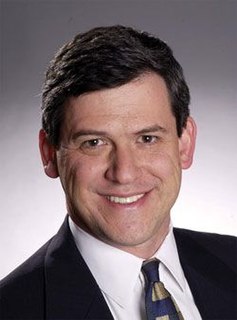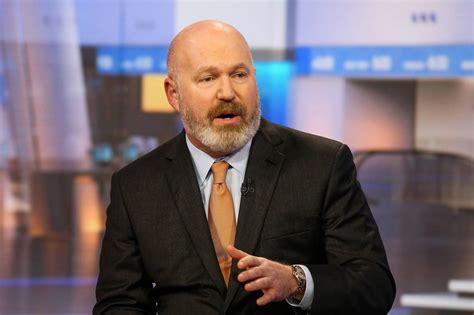Top 1066 Index Funds Quotes & Sayings - Page 18
Explore popular Index Funds quotes.
Last updated on April 16, 2025.
Taxes will eventually become a voluntary process, with the possible exception of real estate - the one physical thing that does not move easily and has computable value. The US has a jump-start on the practice, in that 65 percent of local school funds come from real estate taxes - a practice Europeans consider odd and ill advised. But wait until that's all there is left to tax, when the rest of the things we buy and sell come from everywhere, anywhere, and nowhere.
Are you going to divest in the banks and pension funds? Plenty of people are willing to invest in stock of those companies. You can argue that when a lot of people divest, it makes the stock price artificially low, which makes their price-to-earnings ratio more favorable, which makes it a better investment for the people who don't give a damn - - and is it really going to change corporate behavior? It begins to create a climate of antagonistic opinion, the result might be that the corporate executives will retreat even more into their own selfjustifying narratives.
They [ the government of Puerto Rico] are asking to be given the right to declare bankruptcy, which I think should be an option, as a last resort, if there is no other resource. But there also need to be measures, changes within the government of Puerto Rico, in the ways that the island's funds are administered, not just to deal with this budget issue, but also to have, to attract the economic growth that is necessary for Puerto Rico to begin to grow economically. They are losing population, and they are losing economically.
That would be nice if [people] stuck [treasury bills] all under a mattress, but they got to buy something with them. Sometimes they buy a treasury note, sometimes they set up sovereign wealth funds. They can do all kinds of things. They can buy our companies here. As long as we consume more than we produce, and we trade away little pieces of the country daily, they're going to own something. Now, they can't run from American assets. I mean every day the rest of the world is going to have about two billion more of American assets than we have, as long as they sell us these goods.
I thought you liberals cared about people, but here you're perfectly content to get them addicted to tobacco and make them pay taxes through the nose and continue to pay taxes through the nose and raise their taxes. And then you try to make 'em think you care about 'em by running PSAs telling them how they shouldn't smoke and how they should quit. You're exactly right. If they really cared, they would ban the product, but they can't, because the revenue from tobacco taxes - I'm not kidding you - funds children's health care programs, and a number of other things as well.
Our government has kept us in a perpetual state of fear - kept us in a continuous stampede of patriotic fervor - with the cry of grave national emergency. Always there has been some terrible evil at home or some monstrous foreign power that was going to gobble us up if we did not blindly rally behind it by furnishing the exorbitant funds demanded. Yet, in retrospect, these disasters seem never to have happened, seem never to have been quite real.
In a sense we've come to our nation's capital to cash a check. When the architects of our republic wrote the magnificent words of the Constitution and the Declaration of Independence, they were signing a promissory note to which every American was to fall heir. This note was a promise that all men - yes, black men as well as white men - would be guaranteed the unalienable rights of life, liberty and the pursuit of happiness... America has given the Negro people a bad check, a check which has come back marked 'insufficient funds.'
The Chinese get over 40 percent of their oil from the Middle East through the Persian Gulf, but have you ever seen a Chinese aircraft carrier sitting inside the Persian Gulf? For at least 40 years, the United States of America has been guaranteeing Chinese energy supplies. Sitting here today, the US provides funds to, honest to God, 99 percent of the countries on the planet. We even give North Korea humanitarian aid. We give them food, and God knows what they do with it. They probably feed it to the crooks in the headquarters.
It seems to me that today, if the artist wishes to be serious - to cut out a little original niche for himself, or at least preserve his own innocence of personality - he must once more sink himself in solitude. There is too much talk and gossip; pictures are apparently made, like stock-market prices, by competition of people eager for profit; in order to do anything at all we need (so to speak) the wit and ideas of our neighbors as much as the businessmen need the funds of others to win on the market. All this traffic sharpens our intelligence and falsifies our judgment.
The trouble is that privacy is at once essential to, and in tension with, both freedom and security. A cabinet minister who keeps his mistress in satin sheets at the French taxpayer's expense cannot justly object when the press exposes his misuse of public funds. Our freedom to scrutinise the conduct of public figures trumps that minister's claim to privacy. The question is: where and how do we draw the line between a genuine public interest and that which is merely what interests the public?
Sovereignty inheres in the right to issue money. And the American sovereignty belongs by right to the people, and their representatives in Congress have the right to issue money and to determine the value thereof. And 120 million, 120 million suckers have lamentably failed to insist on the observation of this quite decided law. ... Now the point at which embezzlement of the nation's funds on the part of her officers becomes treason can probably be decided only by jurists, and not by hand-picked judges who support illegality.
In a changing world, some jobs disappear and new ones are created. That's how it has been for hundreds of years. When jobs disappear, the vast majority is not because of global trade, but because of technical advances, robotization and so on. So, we - and in particular, EU member states - have to invest more in training and education so that people will have new opportunities if their jobs are cut. The EU can also better utilize its investment and social funds to protect its citizens from swift changes.
A time comes when silence is betrayal. That time has come for us in relation to Vietnam. A nation that continues year after year to spend more money on military defense than on programs of social uplift, is approaching spiritual death.I knew that America would never invest the necessary funds or energies in rehabilitation of its poor so long as adventures like Vietnam continued to draw men and skills and money like some demonic destructive suction tube. So I was increasingly compelled to see the war as an enemy of the poor.
Community. A friend started a real estate brokerage a few years ago. By the time she'd added her second employee, she was a pillar of her 35,000-person community. No rule says that only the local banker or car dealer can organize the program to raise supplemental funds for the public library or send the high school band on a well-earned special trip. Participating in community affairs, with time more than dollars, is good business from day one. It gets your name around, adds to your distinctiveness, and, best of all, makes you an attractive employer (which is the key to sustained success).
Too bad you didn't just take Max up on his offer, Four. Well, too bad for you, anyway," says Eric quietly as he clicks the bullet into its chamber. My lungs burn; I haven't breathed in almost a minute. I see Tobias's hand twitch in the corner of my eye, but my hand is already on my gun. I press the barrel to Eric's forehead. His eyes widen, and his face goes slack, and for a second he looks like another sleeping Dauntless soldier. My index finger hovers over the trigger. "Get your gun away from his head," I say. "You won't shoot me," Eric replies. "Interesting theory. " I say.
The German health care system is unique in its attempt to combine competition among sickness funds on the one hand and a universal coverage plan on the other hand. Most health care systems are either one or the other, so you either have private insurance and competition but not everyone is covered for everything, or you have a single-payer system. So the ideal types are like the American system on the one hand or the Scandinavian or U.K. systems on the other end.
Germany tries to combine the advantages.
The Internet will not become a money machine until the banking industry figures out how to transfer money for free so you can charge USD 0.005 (half a cent) for some simple service like, say, reading a newspaper article you have searched for. With today's payment system, the cost of the transfer of the funds completely dwarf the cost of the service paid for. ... This situation, however, is what acutely prevents the Internet from taking off as a network for paid services.
It's a slow process, but it is scary, because if someone can control your energy sources, they can control you. We are already being told what light bulbs we can and cannot use...through legislation. We are being forced to fund research into alternative energies sources that are inefficient, and that cause the price of food, energy, and everything else to rise...through legislation...rather than allow free enterprise to allocate funds to those energy sources that will survive through good old American innovation!
Since 1981, after our nations severed diplomatic relations, we've worked through a international tribunal to resolve various claims between our countries. The United States and Iran are now settling a long-standing Iranian government claim against the United States government. Iran will be returned its own funds, including appropriate interest but much less than the amount Iran sought. With the nuclear deal done, prisoners released, the time was right to resolve this dispute as well.
If I'm the president of the United States, I walk right into Union Square, I set up my little presidential podium, and I say, 'Listen, citizens of San Francisco, if you vote against military recruiting, you're not going to get another nickel in federal funds. Fine. You want to be your own country? Go right ahead. And if Al Qaeda comes in here and blows you up, we're not going to do anything about it. We're going to say, look, every other place in America is off limits to you, except San Francisco. You want to blow up the Coit Tower? Go ahead.'
When you buy enough stocks to give you control of a target company, that's called mergers and acquisitions or corporate raiding. Hedge funds have been doing this, as well as corporate financial managers. With borrowed money you can take over or raid a foreign company too. So, you're having a monopolistic consolidation process that's pushed up the market, because in order to buy a company or arrange a merger, you have to offer more than the going stock-market price. You have to convince existing holders of a stock to sell out to you by paying them more than they'd otherwise get.
Santa Claus and the Easter Bunny should take a few pointers from the mutual-fund industry. All three are trying to pull off elaborate hoaxes. But while Santa and the bunny suffer the derision of eight year olds everywhere, actively-managed stock funds still have an ardent following among otherwise clear-thinking adults. This continued loyalty amazes me. Reams of statistics prove that most of the fund industry's stock pickers fail to beat the market.
Ronald Reagan cut taxes to raise the deficit to stop liberals in future years from increasing spending. Obama will raise spending to raise the deficit to stop conservatives in future years from cutting taxes. As he funds every liberal dream - from alternative energy production to infrastructure renovation to more federal revenue sharing - he will force a massive expansion in the size of government for a decade to come.
The underlying strategy of the Fed is to tell people, "Do you want your money to lose value in the bank, or do you want to put it in the stock market?" They're trying to push money into the stock market, into hedge funds, to temporarily bid up prices. Then, all of a sudden, the Fed can raise interest rates, let the stock market prices collapse and the people will lose even more in the stock market than they would have by the negative interest rates in the bank. So it's a pro-Wall Street financial engineering gimmick.
My position is that I am personally opposed to abortion, but I don't think I have a right to impose my view on the rest of society. I've thought a lot about it, and my position probably doesn't please anyone. I think the government should stay out completely. I will not vote to overturn the Court's decision. I will not vote to curtail a woman's right to choose abortion. But I will also not vote to use federal funds to fund abortion.
Rip Van Winkle would be the ideal stock market investor: Rip could invest in the market before his nap and when he woke up 20 years later, he'd be happy. He would have been asleep through all the ups and downs in between. But few investors resemble Mr. Van Winkle. The more often an investor counts his money - or looks at the value of his mutual funds in the newspaper - the lower his risk tolerance.
Thanks to the ongoing support of the Government of Ontario, RHF, in partnership with the Ontario Neurotrauma Foundation, has galvanized Ontario’s best researchers, clinicians and scientists to accelerate the translation of the most promising research into practical solutions. This commitment enables the ongoing leveraging of federal, provincial and private sector funds to allow Canadian SCI researchers to embark on a national and global collective journey towards making a difference in the lives of people with spinal cord injury and other disabilities.
The Nuffield report suggests that there is a moral imperative for investment into GM crop research in developing countries. But the moral imperative is in fact the opposite. The policy of drawing of funds away from low-cost sustainable agriculture research, towards hi-tech, exclusive, expensive and unsafe technology is itself ethically questionable. There is a strong moral argument that the funding of GM technology in agriculture is harming the long-term sustainability of agriculture in the developing world.
I'm actually working on with Autism Speaks. Since my brother's 18, I wanted to work on a program for these older kids. A lot of the schools' special education programs end when the kids are 21, like my brother's school. What is next for these kids? I want him to be constantly active, and not just sitting at home. I want him to be constantly growing and it would be amazing if the funds could go to something like jobs for these kids, or a home where they can be together.
The country is now universally recognised as a nation on the move and takes its place amongst the successful economies in the region. The future potential is enormous but the country's destiny is in our hands. The time has come to move from small increments to bold, large initiatives. The time has come to stretch the envelope and set goals which were earlier not seen to be possible. The time has come for performance to be measured and for allocated funds of the government to reach the people for whom they were intended.
For example: (1) As if governed by Newton's First Law of Motion, an institution will resist any change in its current direction; (2) Just as work expands to fill available time, corporate projects or acquisitions will materialize to soak up available funds; (3) Any business craving of the leader, however foolish, will be quickly supported by detailed rate-of-return and strategic studies prepared by his troops; and (4) The behavior of peer companies, whether they are expanding, acquiring, setting executive compensation or whatever, will be mindlessly imitated.
The conference also has a moral duty to examine the corruption of science that can be caused by massive amounts of money. The United States has disbursed tens of billions of dollars to climate scientists who would not have received those funds had their research shown climate change to be beneficial or even modest in its effects. Are these scientists being tempted by money? And are the very, very few climate scientists whose research is supported by industry somehow less virtuous?
I do believe if one keeps busy it's very good for a person. In fact, people are always rushing into retirement and we read in Europe that people there are talking about their retirement age and moving it to 67 or something. Well, back when they started retirement funds and everything, the average age was 70 or 60, and then all of a sudden now it's 80, and so. [...] And so you keep in shape, you keep yourself mentally in shape. And if you keep yourself mentally in shape, chances are physically it will follow suit.
I would urge the government to allocate more funds toward fighting cancer. My own situation, it made me think. It made me think about the potential of dying. I wouldn't say I was scared. I'm more scared of how it will happen than of it happening. I'm not scared that I'm going to die. I think of how I'm going to die ... I don't want to linger. That scares me a little. The idea of lingering.
A lot of my friends are struggling. A lot of my friends didn't make movies, which was really hard and sad. I'm good friends with this film collective, Red Bucket, which made Daddy Longlegs and The Pleasure Of Being Robbed. They're climbing the walls. They're all making cartoon booklets now, because they can't raise the funds to make another movie. But I think that when it returns, which it hopefully will, there will be another surge of energy.
So get this. On 9/11, Hillary Clinton and Donald Trump's hometown was attacked by the worst terrorist attack in the history of the United States. Young men and women - young men and women signed up to serve in the military to fight terrorism. Hillary Clinton went to Washington to get funds to rebuild her city and protect first responders, but Donald Trump was fighting a very different fight. It was a fight to avoid paying taxes so that he wouldn't support the fight against terror.
The top group of fundraisers for Mr. Obama raised $457,834 for his 2008 campaign - and were approved for federal grants and loans of $11.4 billion, according to the Government Accountability Institute. Selling access to the federal treasury has been a great way for Democrats to raise campaign funds. Since 1989, according to an analysis by Gateway Pundit, big donors have provided $416 million more in direct contributions to Democrats than Republicans.
I think there are probably too many hedge fund managers in the world, as well as active fund managers. The hedge fund industry is very efficient. We see a lot of hedge funds open and a lot close. It's very binary. You either succeed or fail in the hedge fund world. If you succeed, the amount the managers make it beyond most people's wildest dreams of wealth.
The purpose of finance is to enable business to acquire the ownership of capital instruments before it has saved the funds to buy and pay for them. The logic used by business in investing is things that will pay for themselves is not today available to the 95% born without capital. Most of us owe instead of own. And the less the economy needs our labor, the less able we are to "save" our way to capital ownership.
Based on information from the Pentagon and estimates by analysts such as former Reagan Pentagon official Lawrence Korb, the costs of restoring destroyed and damaged Army and Marine Corps equipment is now estimated to be close to $30 billion, and it will grow by an additional $14 billion for every additional year we stay in Iraq. Even if these funds were available tomorrow, it would take years to restore the forces to the state they were in at the outset of the conflict.
At the beginning of World War II the U.S. had a mere 600 or so first-class fighting aircraft. We rapidly overcame this short supply by turning out more than 90,000 planes a year. The question at the start of World War II was: Do we have enough funds to produce the required implements of war? The answer was No, we did not have enough money, nor did we have enough gold; but we did have more than enough resources. It was the available resources that enabled the US to achieve the high production and efficiency required to win the war. Unfortunately this is only considered in times of war.
I believe in an America where the separation of church and state is absolute - where no Catholic prelate would tell the president (should he be Catholic) how to act, and no Protestant minister would tell his parishoners for whom to vote - where no church or church school is granted any public funds or political preference - and where no man is denied public office merely because his religion differs from the president who might appoint him or the people who might elect him.
The massive corruption common in so many developing countries would be quite impossible if Western countries did not provide convenient opportunities to ship ill-gotten funds out of the country. It wouldn't make much sense for a ruler to store in his basement large quantities of stolen cash in his own country's currency. A corrupt ruler wants to be able to keep this money safe and to be able to spend it. And for this, he needs to convert it into a Western currency and store it in a bank abroad, where it can also earn investment returns and be bequeathed to his heirs.
Hedge funds are investment pools that are relatively unconstrained in what they do. They are relatively unregulated (for now), charge very high fees, will not necessarily give you your money back when you want it, and will generally not tell you what they do. They are supposed to make money all the time, and when they fail at this, their investors redeem and go to someone else who has recently been making money. Every three or four years they deliver a one-in-a-hundred year flood. They are generally run for rich people in Geneva, Switzerland, by rich people in Greenwich, Connecticut.
If those millions squandered on designing missionaries had been deposited in funds for the support of yourselves, when old age, misfortune, or sickness (from which none are exempt,) overtakes you, or for the distressed of your race, what a heaven of happiness you would have created on earth: ye would now be an ornament to your sex, and ages to come would call you blessed. But it is in vain to try - a priest-ridden female is lost to reason. Why? because she has surrendered her reason to the ... missionaries ... the orthodox; they are the grand deceivers.
The idea that it's smart to allow Wall Street firms, with this "too big to fail" imprimatur, to become hedge funds again - it's unconscionable. You're essentially saying we're going to take some elites in our society and let them roll the bones in the marketplace, and if it works out they get rich, and if it doesn't work out the taxpayer comes in again. That seems absolutely crazy to me. That seems to be where they're headed. I mean, maybe they're not and I'm wrong. Maybe they'll do sensible things. It's hard to know! There doesn't seem to be a plan.










































